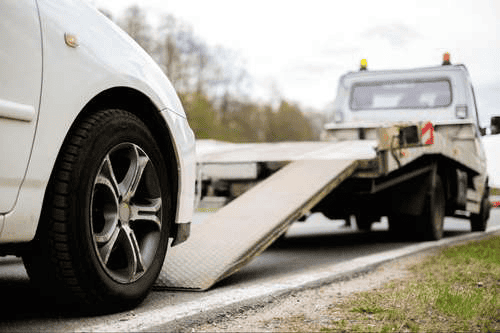Table of Contents
- What Is Title Loan Repossession?
- What Happens When You Default on a Car Title Loan Where Your Title Is Held as Collateral?
- When and How Is Your Car Repossessed After Defaulting on a Title Loan?
- What You Should Know About Title Loan Repossession Laws
- How Can You Get Your Car Back After a Title Loan Repossession?
- What Are Your Rights as a Borrower When Your Car Is Repossessed?
- Preventing Title Loan Repossession
What Is Title Loan Repossession?
You may face title loan repossession if you do not keep your loan in good standing and end up defaulting on a loan. If your loan is in default, that means that you have failed to meet the repayment terms as stated in your loan agreement. Your title lender will legally be able to repossess your vehicle if you default on your loan at any point in time during the repayment process.
The possibility of losing your car is stressful, but it’s important to know that many title lenders would prefer to avoid taking your vehicle. If you are open and honest about your financial struggles with your title lender or loan servicer before you miss a payment, they will oftentimes be willing to work with you to avoid repossession. Your options may include a loan extension or title loan refinancing! If you want to refinance your title loan with your existing lender or a new title lender, you may be able to obtain more manageable loan payments and better loan terms.1
Keep reading to learn more about title loan repossessions and how to get your car back if your vehicle is taken during the repayment process.
What Happens When You Default on a Car Title Loan Where Your Title Is Held as Collateral?
When you take out a title loan, you will use your qualifying car’s title as collateral for the loan. A lender will place a lien on your car’s title after you sign your agreement and the loan is funded. The lien is removed after you’ve made the last payment on your loan. You’re allowed to maintain access to your car during the repayment process, but if you fail to make payments on your loan, the potential consequence of your actions is vehicle repossession.

When and How Is Your Car Repossessed After Defaulting on a Title Loan?
If the loan enters default, the title lender may be legally required to send a right to cure notice, which is essentially a letter that notifies the borrower about the defaulted payments. Typically, the notice provides an exact timeframe that the borrower has to resolve the default by paying the overdue amount. The notice requirements and timeframes to resolve the default vary by state.
In some states, a lender may also be required to give you a written notice after repossessing your vehicle to inform you about the steps you can take to get your car back before it is sold. The lender is typically also obligated to allow you to retrieve any property that was left in the vehicle at the time of the repossession.
After a title loan repossession has occurred, the vehicle will be taken to a tow yard or an impound lot. You may have a certain amount of time to catch up on your missed payments or pay off the entire remaining balance of your loan before the lender sells your vehicle. If the vehicle is sold and the sale proceeds do not cover the balance on your loan, you are still responsible for paying the deficiency balance. If there is any surplus, you are entitled to the money after the sale is complete.
What You Should Know About Title Loan Repossession Laws
It’s important to understand the title loan repossession laws in your state before you sign an agreement for a vehicle-secured loan. Vehicle repossession laws that dictate how this process is handled by lenders and financial institutions can often vary from state to state, but they typically include:
- How Long You Have Before a Repossession Occurs
- How You Can Obtain Your Personal Items That Were Left in Your Vehicle When it Was Repossessed
- Breach of Peace Laws that Prevent the Creditor From Using Force to Repossess Your Vehicle
- Notice of the Final Sale Price of Your Vehicle if You Cannot Recover Your Car
In some states, if the loan enters default, the lender can repossess the vehicle immediately without providing any notice. In order to be adequately prepared to apply for a title loan, you should research the vehicle repossession laws in your state. If you are fully approved for a car title loan, make sure to read through your loan agreement to understand what your repayment schedule looks like. Before signing your agreement, you should read through your loan’s terms and conditions, including your loan’s interest rate.

How Can You Get Your Car Back After a Title Loan Repossession?
If your car has been seized, don’t panic. It is possible to get your car back after a title loan repossession. Take the steps below to try to recover your vehicle!
- Get in Touch As Soon as Possible: The first step you should take to recover your vehicle is to reach out to your lender or loan servicer immediately after your car is seized. Once you are in contact with your lender, you can discuss your outstanding balance and explore your options to get your vehicle back.
- Pay What You Owe: You may be given an opportunity to catch up on your missed payments. If you want to get your car back, that means you must either pay the overdue amount or pay in a lump sum in order to take care of the outstanding balance on your loan. The amount that you owe could include fees, such as late fees, repossession fees, or storage fees from when your car was relocated to a storage lot following the repossession. Your lender will be able to provide more information about the exact amount you need to pay to get your car back in your possession.
What Are Your Rights as a Borrower When Your Car Is Repossessed?
Your rights as a borrower facing title loan repossession can vary depending on your state of residence. As mentioned above, your lender may be required to provide ample notice before your vehicle is repossessed. Additionally, your lender is not legally able to keep any of the items that were in your vehicle at the time of the repossession unless a specified amount of time has passed. That timeframe will usually depend on the applicable laws in your state.
If your car is repossessed and the lender has decided to sell the vehicle, you may be entitled to know where the vehicle is sold. In many states, you are also legally entitled to the opportunity to completely pay the remaining balance of your loan in order to get your vehicle back.
Preventing Title Loan Repossession
Your vehicle likely serves as your primary source of transportation, and you will want to maintain possession of your vehicle and avoid title loan repossession. Not only will losing your car impact your daily routine, but a vehicle repossession on your credit report will negatively impact your score. Having a lower credit score can make it more difficult to obtain new credit or housing in the future.
Below are some of the ways you can try to prevent a title loan repossession:
- Get a Loan You Can Afford: It’s not a smart idea to take out a loan if you cannot fit a loan payment into your current budget. Unless you are willing to cut back significantly on your expenses or increase your income, you are not putting yourself in a position where you are able to succeed financially.
- Budget For Your Loan Payments: You should create an airtight budget before you submit a title loan application so that you have a solid budgeting plan during the repayment process. Make sure to prioritize your title loan payments and adjust your budget as needed to avoid loan default!
- Talk to Your Lender if You are Struggling: If you are searching for title loan relief assistance and you can’t keep up with your payments, one of the simplest ways to try and prevent a title loan repossession is to talk to your lender about your financial situation if it changes during the repayment process. In some cases, your lender may grant a loan extension, which will give you more time to catch up on your payments. Another option to consider is refinancing your existing title loan to potentially get more manageable loan terms.
If you fail to make payments on your title loan, your title loan lender then has the legal right to repossess your vehicle. Before taking out a title loan, it is important to understand this potential consequence and ensure that you borrow responsibly, meaning that you only take out a loan that you can realistically afford to repay. If you are facing vehicle repossession, know there are options for getting your vehicle back and potentially preventing this stressful experience in the future! If you have any questions on title loan repossession or refinancing, do not hesitate to call one of our ChoiceCash title loan agents at 855-422-7402 today.





